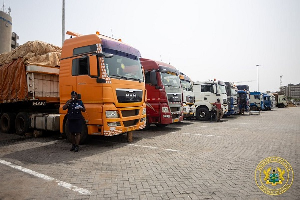Dr. Joseph Fening, Director of the Soil Research Institute, has urged African leaders to empower researchers and research institutions to undertake research that informs policies on sustainable, efficient and equitable management of natural resources.
This, he said, will enable the researchers to provide accurate data about a particular society for a proper solution, saying: “Africa has vast natural resources which if utilised well could help alleviate poverty and increase job-creation to meet the Millennium Development Goals.
“Such approaches will go a long way in ensuring and assuring the country’s resilience to both expected and unexpected climate change shocks,” he stressed.
According to the Dr. Fening, most of the climate change challenges are caused by human activities which need pragmatic measures to resolve the issues affecting the vulnerable.
He was speaking at the opening ceremony of a two-day international conference on enhancing resilience to climate and ecosystem changes in semi-Arid Africa in Tamale.
The forum organised by Climate and Ecosystem Change Adaption and Resilience Research (CECAR)-Africa, and supported by the Japan International Cooperation (JICA), aimed at adapting strategies for mitigating impacts of climate and ecosystem changes on developing societies.
The CECAR-Africa research is a five-year project that focuses on forecast and assessment of climate and ecosystem change impacts on agro-diversity; risk assessment of extreme weather hazards and development of adaptive resource management method; and implementing capacity development programmes for local residents and professionals.
Dr.Fening encouraged African stakeholders to take ownership of climate change challenges by putting in place context-relevant measures that are proactive.
He noted that climate change discussions in Ghana and most African countries have been left out of the mainstream policy issues and do not get the needed attention.
He called on government to resource research on climate change to help address issues confronting the societies contributing to poverty rates.
Touching on the confluence of CECAR-Africa and the ideals of International Partnership for Satoyama Initiative (IPSI), Professor Alfred Oteng-Yeboah of the Department of Botany, University of Ghana said tackling climate change issues will help promote sustainable agriculture that will increase food security for export to generate revenue for development.
In addition, he said it will also ensure availability and sustainability management of water and sanitation to avoid the rampant outbreak of diseases in rural areas.
He called on stakeholders to take action to combat desertification and halt land degradation to protect, restore and promote sustainable use of the terrestrial ecosystem to improve agribusiness.
He said there is a need to find solutions for the numerous environmental problems facing local communities in order to enhance livelihoods.
He urged researchers to use integrated research approaches to build the resilience of local communities in Northern Ghana and the nation as a whole.
Prof. Wisdom Akpalu, Associate Professor of United Nations University (UNUWIDER), University of Ghana, said: “Managing climate change is all about managing risks of an uncertain future.
“It is about being ahead of the curve by putting in place proactive adaptation and mitigation measures that prepare individuals, whole communities and institutions to be ahead of both expected and unexpected shocks.”
According to him, current research on climate projections gives a gloomy picture of further increases in extreme weather events and disasters that could potentially have devastating impacts on the quality of life, social welfare, infrastructure, and livelihood systems.
He therefore called for climate change to be considered a national security issue, which is not aimed at creating unnecessary panic -- it is the reality of a world in change, and one that demands its people to adapt accordingly to meet challenges of the times.
He said the destructive impacts of climate change are already evident in many communities of Ghana, particularly in the coastal settlements and agricultural communities -- while there is growing correlation between climate change, sanitation and public health.
Business News of Tuesday, 12 August 2014
Source: B&FT













